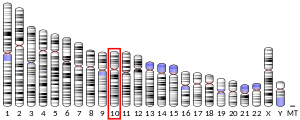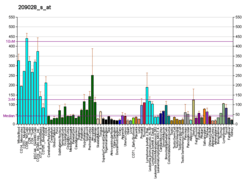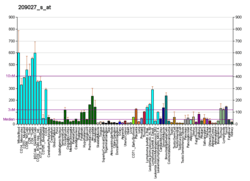ABI1
Abl interactor 1 also known as Abelson interactor 1 (Abi-1) is a protein that in humans is encoded by the ABI1 gene.[5][6]
Function
Abl interactor 1 has been found to form a complex with EPS8 and SOS1, and is thought to be involved in the transduction of signals from Ras to Rac. In addition, the encoded protein may play a role in the regulation of EGF-induced Erk pathway activation as well as cytoskeletal reorganization and EGFR signaling. Several transcript variants encoding multiple isoforms have been found for this gene.[7]
Abi1 is adaptor protein. It interacts with c-Abl and WAVE2 which is an actin polymerization regulator. It is known that Abi1 enhances the phosphorylation of WAVE2 by c-Abl. The phosphorylation of c-Abl promotes actin polymerization. Furthermore, Abi1 is a component of the WAVE complex. Some research has shown that knockdown of Abi1 by siRNA promoted degradation of WAVE complex proteins.
Interactions
ABI1 has been shown to interact with
ENAH,[8] NCKAP1,[9] EPS8,[6][8][9][10][11] and SOS1.[12]
References
- GRCh38: Ensembl release 89: ENSG00000136754 - Ensembl, May 2017
- GRCm38: Ensembl release 89: ENSMUSG00000058835 - Ensembl, May 2017
- "Human PubMed Reference:". National Center for Biotechnology Information, U.S. National Library of Medicine.
- "Mouse PubMed Reference:". National Center for Biotechnology Information, U.S. National Library of Medicine.
- Ziemnicka-Kotula D, Xu J, Gu H, Potempska A, Kim KS, Jenkins EC, Trenkner E, Kotula L (Jul 1998). "Identification of a candidate human spectrin Src homology 3 domain-binding protein suggests a general mechanism of association of tyrosine kinases with the spectrin-based membrane skeleton". J Biol Chem. 273 (22): 13681–92. doi:10.1074/jbc.273.22.13681. PMID 9593709.
- Biesova Z, Piccoli C, Wong WT (Feb 1997). "Isolation and characterization of e3B1, an eps8 binding protein that regulates cell growth". Oncogene. 14 (2): 233–41. doi:10.1038/sj.onc.1200822. PMID 9010225.
- "Entrez Gene: ABI1 abl-interactor 1".
- Tani K, Sato S, Sukezane T, Kojima H, Hirose H, Hanafusa H, Shishido T (June 2003). "Abl interactor 1 promotes tyrosine 296 phosphorylation of mammalian enabled (Mena) by c-Abl kinase". J. Biol. Chem. 278 (24): 21685–92. doi:10.1074/jbc.M301447200. PMID 12672821.
- Yamamoto A, Suzuki T, Sakaki Y (June 2001). "Isolation of hNap1BP which interacts with human Nap1 (NCKAP1) whose expression is down-regulated in Alzheimer's disease". Gene. 271 (2): 159–69. doi:10.1016/S0378-1119(01)00521-2. PMID 11418237.
- Offenhäuser N, Borgonovo A, Disanza A, Romano P, Ponzanelli I, Iannolo G, Di Fiore PP, Scita G (January 2004). "The eps8 Family of Proteins Links Growth Factor Stimulation to Actin Reorganization Generating Functional Redundancy in the Ras/Rac Pathway". Mol. Biol. Cell. 15 (1): 91–8. doi:10.1091/mbc.E03-06-0427. PMC 307530. PMID 14565974.
- Lanzetti L, Rybin V, Malabarba MG, Christoforidis S, Scita G, Zerial M, Di Fiore PP (November 2000). "The Eps8 protein coordinates EGF receptor signalling through Rac and trafficking through Rab5". Nature. 408 (6810): 374–7. Bibcode:2000Natur.408..374L. doi:10.1038/35042605. PMID 11099046.
- Scita G, Nordstrom J, Carbone R, Tenca P, Giardina G, Gutkind S, Bjarnegård M, Betsholtz C, Di Fiore PP (September 1999). "EPS8 and E3B1 transduce signals from Ras to Rac". Nature. 401 (6750): 290–3. Bibcode:1999Natur.401..290S. doi:10.1038/45822. PMID 10499589.
Further reading
- Ichigotani Y, Fujii K, Hamaguchi M, Matsuda S (2002). "In search of a function for the E3B1/Abi2/Argbp1/NESH family (Review)". Int. J. Mol. Med. 9 (6): 591–5. doi:10.3892/ijmm.9.6.591. PMID 12011975.
- Di Fiore PP, Scita G (2002). "Eps8 in the midst of GTPases". Int. J. Biochem. Cell Biol. 34 (10): 1178–83. doi:10.1016/S1357-2725(02)00064-X. PMID 12127568.
- Cardwell C (1977). "Student or worker? International Meeting of Student Nurses (European Group)". Nursing Mirror and Midwives Journal. 143 (19): 38. PMID 1049958.
- Biesova Z, Piccoli C, Wong WT (1997). "Isolation and characterization of e3B1, an eps8 binding protein that regulates cell growth". Oncogene. 14 (2): 233–41. doi:10.1038/sj.onc.1200822. PMID 9010225.
- Taki T, Shibuya N, Taniwaki M, et al. (1998). "ABI-1, a human homolog to mouse Abl-interactor 1, fuses the MLL gene in acute myeloid leukemia with t(10;11)(p11.2;q23)". Blood. 92 (4): 1125–30. PMID 9694699.
- Scita G, Nordstrom J, Carbone R, et al. (1999). "EPS8 and E3B1 transduce signals from Ras to Rac". Nature. 401 (6750): 290–3. Bibcode:1999Natur.401..290S. doi:10.1038/45822. PMID 10499589.
- Courtney KD, Grove M, Vandongen H, et al. (2000). "Localization and phosphorylation of Abl-interactor proteins, Abi-1 and Abi-2, in the developing nervous system". Mol. Cell. Neurosci. 16 (3): 244–57. doi:10.1006/mcne.2000.0865. PMID 10995551.
- Fan PD, Goff SP (2000). "Abl Interactor 1 Binds to Sos and Inhibits Epidermal Growth Factor- and v-Abl-Induced Activation of Extracellular Signal-Regulated Kinases". Mol. Cell. Biol. 20 (20): 7591–601. doi:10.1128/MCB.20.20.7591-7601.2000. PMC 86315. PMID 11003655.
- Xu J, Ziemnicka D, Merz GS, Kotula L (2001). "Human spectrin Src homology 3 domain binding protein 1 regulates macropinocytosis in NIH 3T3 cells". J. Cell Sci. 113 (21): 3805–14. PMC 4511602. PMID 11034908.
- Lanzetti L, Rybin V, Malabarba MG, et al. (2000). "The Eps8 protein coordinates EGF receptor signalling through Rac and trafficking through Rab5". Nature. 408 (6810): 374–7. Bibcode:2000Natur.408..374L. doi:10.1038/35042605. PMID 11099046.
- Yamamoto A, Suzuki T, Sakaki Y (2001). "Isolation of hNap1BP which interacts with human Nap1 (NCKAP1) whose expression is down-regulated in Alzheimer's disease". Gene. 271 (2): 159–69. doi:10.1016/S0378-1119(01)00521-2. PMID 11418237.
- Cowan CA, Henkemeyer M (2001). "The SH2/SH3 adaptor Grb4 transduces B-ephrin reverse signals". Nature. 413 (6852): 174–9. Bibcode:2001Natur.413..174C. doi:10.1038/35093123. PMID 11557983.
- Ichigotani Y, Yokozaki S, Fukuda Y, et al. (2002). "Forced expression of NESH suppresses motility and metastatic dissemination of malignant cells". Cancer Res. 62 (8): 2215–9. PMID 11956071.
- Mammalian Gene Collection Program Team; Strausberg, R. L.; Feingold, E. A.; Grouse, L. H.; et al. (2002). "Generation and initial analysis of more than 15,000 full-length human and mouse cDNA sequences". Proceedings of the National Academy of Sciences. 99 (26): 16899–16903. Bibcode:2002PNAS...9916899M. doi:10.1073/pnas.242603899. PMC 139241. PMID 12477932.
- Salomon AR, Ficarro SB, Brill LM, et al. (2003). "Profiling of tyrosine phosphorylation pathways in human cells using mass spectrometry". Proc. Natl. Acad. Sci. U.S.A. 100 (2): 443–8. Bibcode:2003PNAS..100..443S. doi:10.1073/pnas.2436191100. PMC 141014. PMID 12522270.
- Morerio C, Rosanda C, Rapella A, et al. (2003). "Is t(10;11)(p11.2;q23) involving MLL and ABI-1 genes associated with congenital acute monocytic leukemia?". Cancer Genet. Cytogenet. 139 (1): 57–9. doi:10.1016/S0165-4608(02)00616-7. PMID 12547160.
- Gevaert K, Goethals M, Martens L, et al. (2004). "Exploring proteomes and analyzing protein processing by mass spectrometric identification of sorted N-terminal peptides". Nat. Biotechnol. 21 (5): 566–9. doi:10.1038/nbt810. PMID 12665801.
External links
- ABI1 human gene location in the UCSC Genome Browser.
- ABI1 human gene details in the UCSC Genome Browser.





